George Onslow (1784-1853) : the
"French Beethoven" by Baudime Jam
(This article was presented to MusicWeb
and was unsolicited)
Biography
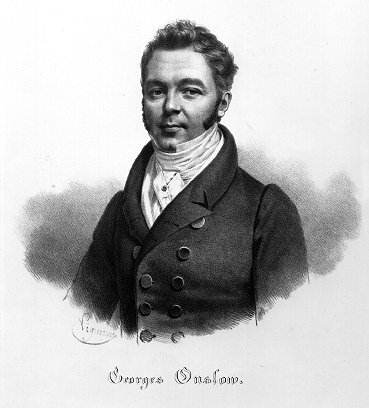
George Onslow is a
very special figure in the history of
music: widely and unanimously acclaimed
when he was alive, he is now nearly
forgotten and his works, mainly devoted
to string chamber music, are largely
missing from the repertoire, partly
due to the fact that they haven't been
available in a modern edition for more
than a century.
Stemming from an old
aristocratic British family, several
members of whom played an important
part in British political life (his
grand-father, first Earl of Onslow,
was the Speaker of the House of Commons),
George Onslow was born in Clermont-Ferrand
(centre of France) in 1784. His father,
Edward, had settled there after a family
scandal which forced him to leave his
mother country.
Quickly integrated
into the Clermont nobility, the Onslows
led a peaceful life until the Revolution
of 1789 which jeopardised their safety.
Jailed in 1793 because of his nationality
and in spite of his friendship with
Couthon, whose freemason brother he
was, Edward Onslow was forced into exile
in 1797. His first stops were Rotterdam
and Hamburg. His older son, George,
joined him in what became a grand study
tour. Between 1798 and 1806 he studied
the piano with several masters, especially
Cramer, Dussek and Hüllmandel who
were teaching in London. Stays in Germany
and Austria enabled him to improve his
training as an instrumentalist. His
father’s exile ended in 1804.
Onslow did not mean
to become an artist, still less a composer:
studying the piano was only part of
his education, as well as mathematics,
history, fencing, horse riding, drawing
(two of his brothers devoted themselves
to painting), etc. In his parent's opinion,
his musical talent was more a drawing-room
gift than a professional ability. Onslow
never gave a recital as a pianist: he
only gave concerts in the provincial
town of Clermont and then only demonstrating
his gift for improvisation (which he
never did in Paris), He also practised
the cello as an amateur in order to
be part of a quartet of friends with
whom he played the masters' repertoire
(Mozart, Haydn, and young Beethoven).
Onslow discovered his
vocation as a composer while listening
to the Overture of an opera by Méhul,
called Stratonice. He was then 22 years
of age. His first attempts, a set of
three string quintets, were so successful
that his friends, Pleyel, his publisher,
and his interpreters encouraged him
to persevere. Many other chamber pieces
followed, but soon Onslow realized his
shortcomings. This decided him on completing
his theoretical knowledge which he did
by studying with Anton Reicha, who was
his only master in composition. His
influence would be decisive aesthetically
as well as stylistically.
Onslow then, launched
into a brilliant career which turned
him into a leading composer of musical
life in the first half of the nineteenth
century. He was be played by the greatest
musicians of his time and his name was
plaaced next to Mozart, Haydn and Beethoven,
of whom it was said that he was the
only worthy successor. Nicknamed "the
French Beethoven", he was the only musician,
at least in France, who devoted himself
to chamber music. Composing 36 quartets
and 34 quintets, Onslow left us exceptional
works which supplied main European concert
societies for more than fifty years.
His music also enriched publishers even
in the United States (Schirmer).
Onslow mainly achieved
national glory in Germany where he was
much admired and praised. He was famous
among musicians and audiences. Mendelssohn
and Schumann witnessed this live. His
contemporaries admired him and he was
widely published. He was also acknowledged
by the world’s institutions: being made
a member of most European Philharmonic
societies: London in 1829 along with
Mendelssohn, Rotterdam in 1834, Vienna
in 1836, Rome in 1839, Florence in 1839,
Cologne in 1847, Strasbourg in 1849
and Stockholm in 1851. He was elected
in 1842 to the Fine Arts Academy, in
particular before Berlioz.
At a time when, in
Paris, vaudeville and opéra-comique
were most favoured, Onslow embodied
the continuity of the great classic
school and represents evidence for those
who claim music is decadent while musical
life is "privatised". The "soirées
de quatuors" of Baillot in Paris, Lindley
in London and Zimmerman in Berlin were
thought to be the last refuges of "true
music". Onslow became the herald of
those who defended tradition and instrumental
excellence against the drifts of romances,
quadrilles and other entertainment compositions
and salon effusions.
Onslow composed no
less than three operas though he did
this out of curiosity and because he
wanted to enhance his fame: The Alcade
of Vega, 1824 ; The Pedlar, 1827 ; The
Duke of Guise, 1837. Although these
works were given at the "salle Favart",
those who witnessed their premieres
unanimously declared that they could
have been given at the "Opera". Onslow's
lyric scores were dense and unusually
complex for the audience. Their librettos
were not of great value (a inhibiting
defect in those days, especially in
France). The critics loved them and
Berlioz himself enthusiastically defended
the Duke of Guise.
In his instrumental
and orchestral music (4 symphonies),
Onslow announces romanticism by the
richness of his harmony, the preponderance
of chromaticisms, his storm-like tormented
inspiration and the fervour of his lyrical
themes. One of the reasons why interpreters
gave up playing his quartets and quintets
was because they were so difficult to
perform.
His life was mainly
quiet and free from anxiety. On one
occasion he was victim of a serious
accident: during a hunting trip in 1829
he was badly injured by a shot. He could
have died and became deaf in the left
ear as a result of this accident which
inspired him to write the three last
movements of his quintet opus 38, entitled
"The bullet".
Although he had a brilliant
international career and though he was
repeatedly in concert demand Onslow
always remained faithful to Auvergne.
Born in Clermont-Ferrand, he also died
in the same town. This loyalty put him
apart from artists who moved to Paris.
He was deeply attached to his hometown
and well-known for his generosity (charity
concerts, help to poor people, etc.).
By his courteous and gracious behaviour,
Onslow gave Clermont all the prestige
of his name, but his music was never
really appreciated and understood. Onslow
was very involved in the modest musical
life of his province: his most important
project was the foundation of a Philharmonic
Society in 1839.
He was a respected
and admired castle owner: a real gentleman-farmer,
as talented running his properties as
in negociating contracts with Breitkopf
& Härtel or Schlesinger. Although
he had a property in the countryside
(castle of Chalendrat, then castle of
Bellerive), he always kept his apartments
in Clermont: first in Michel de l'Hospital
square (called Wood market square at
the begenning of the 19th century),
then number 2 Blaise Pascal street where
he died on October 3rd 1853. He rests
at the Carmes cemetary, next to some
of the well-know families in Auvergne.
Baudime Jam (translated
by Patrick Marcel)
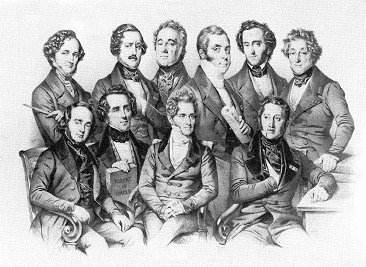
Gallery of the modern
lyric composers by A. Maurin (1844).
From left to right, 1st raw: Halévy,
Meyerbeer, Spontini, Rossini ; 2nd raw:
Berlioz, Donizetti, Onslow, Auber, Mendelssohn,
Berton.
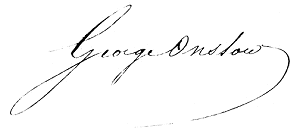
Signature of George
Onslow
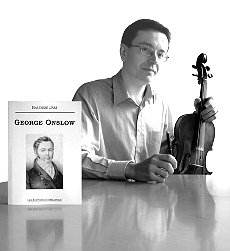
Baudime Jam
is the author of the complete biography
of George Onslow (564 pages - ISBN:
2-9520076-0-8) for which he gathered
a great deal of documents in France,
Germany and England. They enable us,
at last, to know the life of this forgotten
composer in all its aspects, with great
details, and a relevant aesthetic and
historical sense of analysis.. This
book is entirely based on original sources
which were mostly never published (letters,
readings of the French and European
press, writings, iconography, etc.).
It is meant to be a reference, not only
on this composer who deserves to be
seriously rediscovered, but also on
one of the richest times in the history
of modern music.
Onslow's career has
to be linked with the great questionings
which upset musicians, journalists and
audience in his days. Studying his life
means diving back into the deepest changes
which modified the European artistic
landscape at the beginning of the 19th
century. Baudime Jam is also responsible
for the first full critical edition
of the George Onslow's 36 string quartets,
which had been unavailable for more
than a century. This collection has
been prefaced by maestro Serge Collot
(Parrenin quartet, Trio français,
CNSM of Paris, etc.) - excerpt: "This
edition of the George Onslow's chamber
music arrives just in time to enlarge
the repertoire with an important missing
link.
This is a very complex
task as the sources are very divergent.
I trust completely Mr Baudime Jam to
fulfil this assignment and I thank him
heartily for this achievement." This
editorial event should enable the reintroduction
of this chamber music treasure into
the repertory. Several editions of the
time have been studied and compared,
so that, in some cases, two different
versions of the same movement could
be offered.
Baudime Jam has been
invited to deliver a number of lectures
in order to introduce his works who
were supported among others by the French
Ministry of Culture: among these lectures,
one can mention those which took place
at the castle Chalendrat (September
28th), in Clermont-Ferrand for the Alliance
Française (October 16th), and
at the University of La Sorbonne (Paris)
on November 6th.
As the author of this
biography and editor of the Onslow's
chamber music, but also as a lecturer
and an interpreter (member of the Prima
Vista quartet), and as the artistic
director and founder of the festival
"Les soirées Onslow dans les
châteaux d'Auvergne", Baudime
Jam is currently known as the fullest
Onslow specialist.
The biography and the
first book of three quartets (opus 9,
including the beautiful variations on
"God save the King"), were published
in September 2003. They are available
on many important websites, but also
at the "Éditions du mélophile".
Inquieries should be made in French,
German or English at: melophile@free.fr
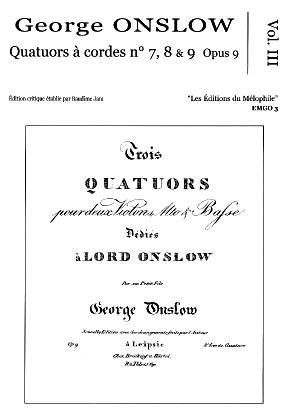
The first book of
the complete quartets' edition (N.B.:
it is volume III because the 12 volumes
are not being published in chronological
order).
George
Onslow website